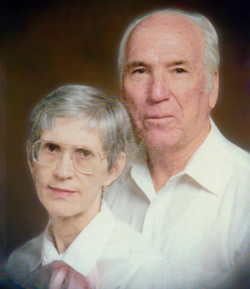
No one at Baylor University Medical Center would remember Opal and Ellis Goodrum. But their personal experience with Baylor defined their lives when their only son Craig died from brain cancer at age 46. The Goodrum’s great-nephew and executor, Paul Rowlett, said they never fully recovered after Craig’s death, but were very grateful for Baylor's care for him. Last year, Opal and Ellis, both in their 90s and married 75 years, died within four days of each other.
During their lives, the Goodrums expressed gratitude to Baylor in ways appropriate for them. Over nine years they made 23 gifts totaling $660. Their largest gift was $50, the smallest $15.
But their desire to support Baylor’s fight against brain cancer was obviously big on their minds when they made their wills. Upon their deaths, their executor notified Cynthia Krause at Baylor Scott & White Dallas Foundation that the Goodrums had left a bequest to the Foundation of $134,000 for cancer research. He said this gift represented a significant portion of the Goodrum’s estate.
For the majority of donors, their largest gifts must come from their estates, whether through a last will and testament, proceeds from an IRA, retirement plan, or insurance policy. For this reason, estate gifts are commonly 10 to 100 times the amount of an individual’s lifetime gifts to causes that are deeply meaningful to him or her. In the Goodrum’s case, their legacy for cancer research is more than 200% larger than the total amount they gave during their lifetimes!
Karen Fink, M.D. Ph.D., Director of Neuro-Oncology at Baylor University Medical Center, said, “When a person endures a fight with brain cancer then loses that fight, every member of the family is affected in a way that is long lasting. These families are motivated by a desire to prevent such deaths in the future, and sometimes, even long after the devastating events, they make a gift that can make a real difference. The Goodrum’s have made such a gift.”
Physicians and researchers at Baylor Scott & White Health (BSWH) continue their work with patients diagnosed with brain cancer, including conducting clinical trials with promising drugs and other new therapies. As we learn more about our brains and cancer through new technologies, we are seeing outcomes only dreamed about when Craig lost his life to cancer many years ago. The Goodrum’s legacy helps us continue our work with patients diagnosed with brain cancers.
For more information on leaving a bequest, IRA, insurance or other estate gift, contact Cynthia Krause at 214.820.7928 or Cynthia.Krause@BSWHealth.com, or email GiftPlanningDallas@BSWHealth.com.
